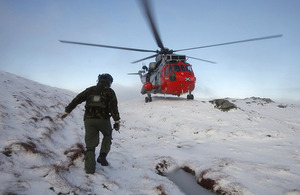Busy week for Royal Navy Search and Rescue crews
The Royal Navy duty Search and Rescue crews from HMS Gannet at Prestwick in Ayrshire have just completed a run of seven call-outs in eight days.

A serviceman approaches HMS Gannet's Search and Rescue helicopter on a snowy mountainside (stock image) [Picture: Crown Copyright/MOD]
Taking them to the extreme north and south of their usual response area, as well as into Northern Ireland in the west and the Trossachs in the east, the helicopter and its crews have been pushed hard in this last week.
Christmas week, 20-26 December, brought six call-outs for the duty teams, including one on Christmas Day and two on Boxing Day. Three of the calls were to medical transfers from the Isle of Islay, and the others included sorties to Lochgilphead and the Isle of Bute.
The following week, which included Hogmanay and New Year’s Day, however, was unseasonably quiet, but from 3-10 January 2011, the emergency crews stepped back up to full tempo, including one day which took them from the extreme north of their coverage area, Ben Nevis, to the extreme south, in the Lake District.
During that week, six people were rescued after a total of some 13 hours of flying time - an average of nearly two hours per job.
The call-outs included transferring a casualty who had fallen overboard from a boat in Argyll to Crosshouse Hospital in Kilmarnock; transporting a casualty of a road traffic collision from Stirlingshire to hospital in Edinburgh; and a request to search for two missing persons in Northern Ireland.
On Saturday 8 January, one crew was called both north and south.
At 1340hrs the duty team received a call from Fort William police to aid in the search and subsequent rescue of two fallen climbers on Ben Nevis.
Arriving on scene, aircrewman and paramedic Sergeant Andy Dixon, who is on exchange to the Royal Navy from the Royal Air Force, was winched down to the casualties to assess the next step.
For Sgt Dixon, this was his first major mountain job since his recent start at the unit. He was about to find that the situation was not quite as straightforward as he might have hoped.
Arriving alongside the climbers, Sgt Dixon found that they were both French and spoke no English, therefore making diagnosis very tricky. However, he was able to make an assessment of the pair, and elected to winch the stricken duo straight out in order to expedite the rescue as speedily as possible.
The casualties were then transported rapidly down the mountain to a waiting ambulance and a doctor from the mountain rescue team.
After three hours in the sky, the crew returned to Prestwick at 1635hrs.
They then had all of an hour before their second emergency call came in, this time to the southern extreme of their operational area, to rescue a climber stuck on Great End in the Scafell Range of the Lake District. The crew arrived on scene to find that the Keswick Mountain Rescue Team had already safely recovered the climber, and the helicopter’s services were no longer required.
After their busy day, the crew, comprising pilots Lieutenant George ‘Logie’ Baird and Lieutenant Andy Ellis, observer Lieutenant Commander Dave Reese, and Sergeant Andy Dixon RAF, landed back at Gannet at 1940hrs to recharge their batteries and await the next call.